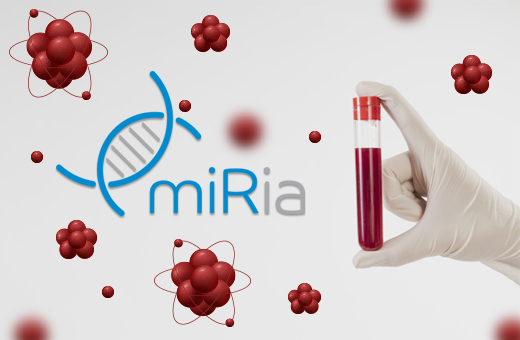hsa-miR-93-5p miREIA
MicroRNAs (miRNAs) are small non-coding RNA molecules, approximately 22 nucleotides in length that regulate gene translation through silencing or degradation of target mRNAs. They are involved in multiple biological processes, including differentiation and proliferation, metabolism, hemostasis, apoptosis or inflammation, and in pathophysiology of many diseases. Numerous studies have suggested circulating miRNAs as promising diagnostic and prognostic biomarkers of many diseases.
Recent studies indicate that miRNAs function as oncogenes and tumor suppressors. Dysregulated miRNAs can promote tumorigenesis and cancer progression and even result in poor cancer prognosis. Cancer-specific miRNAs are present in extracellular body fluids, and may play an important role in crosstalk between cancer cells and surrounding normal cells.
hsa-miRNA-93 is a member of the miR-106b-25 cluster. hsa-miR-93 has been reported to be upregulated and have a promoting role in several cancer types. Increasing body of evidence indicates that the dysregulation of hsa-miR-93-5p is associated with development of multidrug resistance in various types of cancer.
miRNAs are also key regulators of many cellular events in pathogenesis of atherosclerosis. hsa-miR-93-5p is specifically associated with coronary artery disease. Several groups have reported potential utility of miRNAs as biomarkers in diagnosis and prediction of cardiovascular disease.
Moreover, hsa-miR-93-5p might help to assess pathophysiological changes associated with chronic kidney disease and potential bone-specific and vascular risks as well as therapy aspects in pacients with chronic kidney disease.
Features
- It is intended for research use only
- The total assay time is less than 2.5 hours
- The kit measures hsa-miR-93-5p isolated from human blood
- Assay format is 96 wells
- Standard is synthetic miRNA-based
- Components of the kit are provided ready to use, concentrated or dried
Research topic
Cardiovascular disease, Oncology, Renal disease
Type
miREIA – miRNA enzyme immunoassay
Applications
Whole blood
Sample Requirements
10 µl/well
Storage/Expiration
Store the complete kit at 2 – 8 °C. Under these conditions, all components are stable until the expiration date (see label on the box).
Calibration Curve
Calibration Range
12.5 – 0.39 amol/μl
Limit of Detection
0.13 amol/μl
Intra-assay (Within-Run)
n = 8,
CV = 8.4%
Inter-assay (Run-to-Run)
n = 5,
CV = 9.3%
Spiking Recovery
96.4%
Dilutation Linearity
102.4%
- SUETA, Aiko, et al. Differential expression of exosomal miRNAs between breast cancer patients with and without recurrence. Oncotarget, 2017, 8.41: 69934.
- LI, Nana, et al. MiR-106b and miR-93 regulate cell progression by suppression of PTEN via PI3K/Akt pathway in breast cancer. Cell Death & Disease, 2017, 8.5: e2796.
- WANG, Shi-Jun, et al. MicroRNA-93-5p increases multidrug resistance in human colorectal carcinoma cells by downregulating cyclin dependent kinase inhibitor 1A gene expression. Oncology Letters, 2017, 13.2: 722-730.
- GAMBARI, Roberto, et al. Targeting oncomiRNAs and mimicking tumor suppressor miRNAs: Νew trends in the development of miRNA therapeutic strategies in oncology. International journal of oncology, 2016, 49.1: 5-32.
- HE, Yu; YU, Bo. MicroRNA-93 promotes cell proliferation by directly targeting P21 in osteosarcoma cells. Experimental and Therapeutic Medicine, 2017, 13.5: 2003-2011.
- OHTA, Katsuya, et al. MicroRNA-93 activates c-Met/PI3K/Akt pathway activity in hepatocellular carcinoma by directly inhibiting PTEN and CDKN1A. Oncotarget, 2015, 6.5: 3211.
- CHEN, Rui, et al. MicroRNA-93 promotes the malignant phenotypes of human glioma cells and induces their chemoresistance to temozolomide. Biology open, 2016, 5.6: 669-677.
- JOHN, F. O., et al. miRNA-93-5p and other miRNAs as predictors of coronary artery disease and STEMI. International journal of cardiology, 2016, 224: 310- 316.
- ULBING, M., et al. MicroRNAs 223-3p and 93-5p in patients with chronic kidney disease before and after renal transplantation. Bone, 2017, 95: 115-123.


